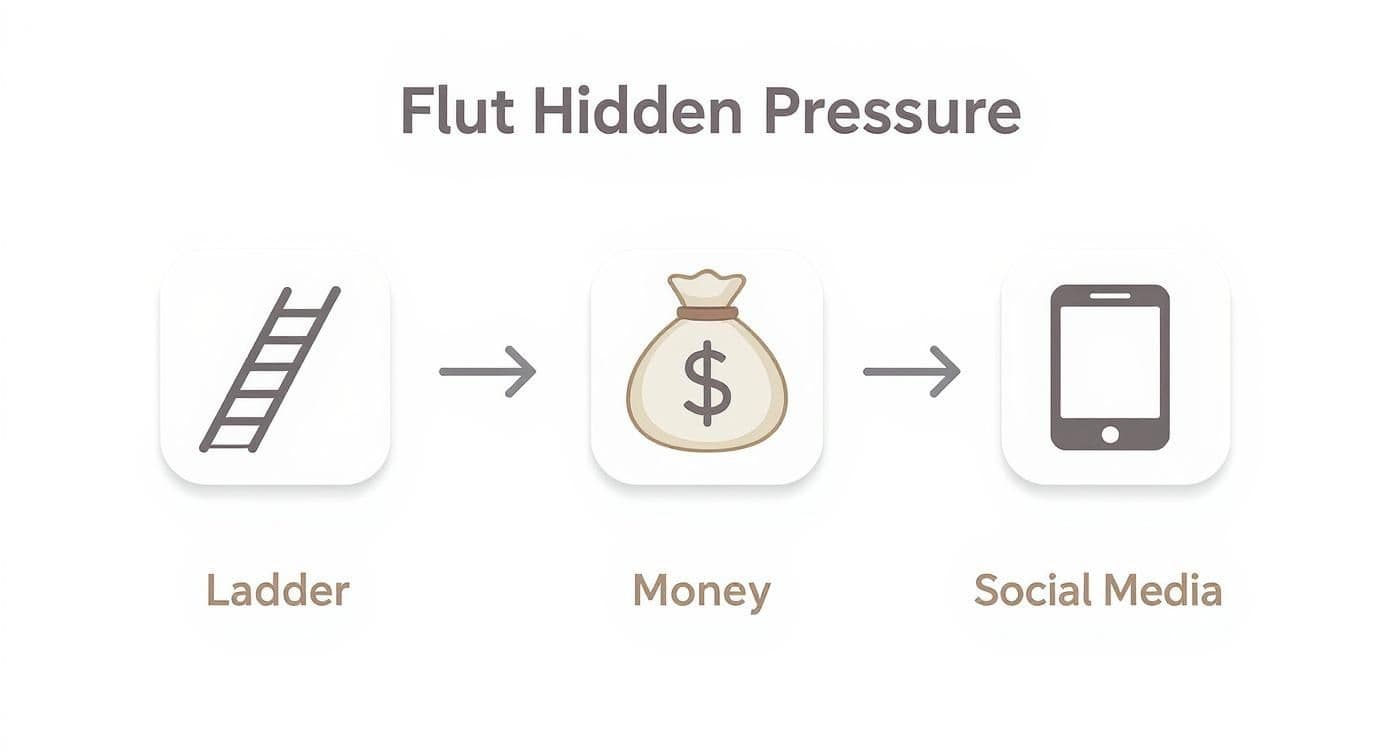If you’ve ever silently asked, “Why am I so unhappy with my life?” know this: that feeling is a signal, not a verdict. It often points to a gap between what you’re doing and who you truly are. This article helps you move from confusion to clarity with practical steps to realign daily choices with your deepest values.
November 7, 2025 (26d ago) — last updated December 3, 2025 (Today)
Why Am I Unhappy With My Life? Find Purpose
Feeling lost? Learn practical steps to find purpose, reduce unhappiness, and align your life with your values using self-discovery and simple actions.
← Back to blog
Why Am I Unhappy With My Life? Find Purpose
Summary: Feeling lost and asking “why am I so unhappy with my life?” Discover a clear, practical path to purpose and fulfillment using timeless wisdom adapted for today.
Introduction
If you’ve ever silently asked, “Why am I so unhappy with my life?” know this: that feeling is a signal, not a verdict. It often points to a gap between what you’re doing and who you truly are. This article helps you move from confusion to clarity by identifying where the misalignment lives and offering practical, manageable steps to create a life that feels authentic and meaningful.
Understanding Deep Dissatisfaction

Feeling unhappy with your life isn’t failure. Think of it as an internal compass nudging you to re-evaluate your direction. Many people follow scripts they never wrote—taking jobs that look impressive, staying in relationships out of habit, and measuring success by someone else’s standards. Over time, that gap between the life you live and the person inside can become a persistent emptiness.
The Source of the Struggle
You’re not alone. Recent global surveys show rising levels of worry and stress, which often reflect broader social pressures rather than a personal failing1. The first step is simple: acknowledge the dissatisfaction without blame. Curiosity leads to clarity; clarity leads to change.
This guide draws on practical self-discovery tools, including themes from Dan Millman’s book, The Life You Were Born to Live, and resources available through the Life Purpose App.
Shift Your Perspective
Try seeing this unhappiness as a question waiting for an answer rather than a problem to fix immediately. That mindset moves you from passive suffering into active discovery. Practicing basic mindfulness can help you observe thoughts and feelings without getting swept away; see this guide on how to practice mindfulness for starters.
Common Sources of Life Dissatisfaction
| Area of Life | Common Feelings | Potential Root Cause |
|---|---|---|
| Career/Work | Boredom, exhaustion, feeling unappreciated | A job that doesn’t match your values or strengths |
| Relationships | Loneliness, recurring conflict, feeling unseen | Connections based on habit or obligation rather than fit |
| Personal Growth | Stagnation, lack of learning | Fear of change or absence of direction |
| Spiritual Life | Emptiness, lack of meaning | A disconnect from your inner self or purpose |
Reflecting on these areas helps you pinpoint where the friction lives.
What this journey can unlock:
- Identify core misalignments between your life and your nature.
- Rediscover strengths you’ve pushed aside.
- Reframe challenges as opportunities for growth.
The Hidden Pressures That Steal Your Joy
That nagging question—“Why am I so unhappy with my life?”—often gets louder when you feel behind others. We live amid curated lives on social media and cultural scripts that push a single definition of success. Chasing those external markers can feel like running on a treadmill: lots of effort, little fulfillment.
The Comparison Treadmill
As adults, the single path splinters into many directions, and without a personal map we start measuring ourselves against everyone else. That sideways glance drains energy and pulls us further from what lights us up. Asking “Why am I so unhappy?” often means you’re measuring your life with someone else’s ruler. Realigning your markers of success is the only way off the treadmill.
Chasing External Validation
External approval gives quick highs but no lasting nourishment. A promotion or praise can feel good briefly, but if those things don’t connect to your inner truth, the emptiness returns. Core human needs—security, social support, and personal freedom—are essential for life satisfaction and can’t be replaced by status alone2.
Redefine Your Markers of Success
Change the destination. Shift from asking “What will make me look successful?” to “What will make me feel fulfilled?” Try these steps:
- Focus on fulfillment—prioritize activities that feed your values.
- Celebrate small wins—notice daily acts that align with who you are.
- Use tools like Dan Millman’s system to clarify what brings you joy and where you’ll meet resistance.
Stepping off the comparison treadmill redirects your energy toward a life that feels right from the inside out.
Discover Your Inner Blueprint Through Numerology
When you’re lost, a compass helps. Numerology—used here as a framework of self-understanding—can act like that compass. Dan Millman’s The Life You Were Born to Live presents numerology as a psychological and spiritual tool for clarifying innate strengths, challenges, and life themes.

What Is a Life Path Number?
Your life number, calculated from your birth date, reflects the core energies shaping your journey. It’s not a label but a guide—like an owner’s manual for your temperament and lessons. Knowing this number helps you make choices that fit your design rather than constantly fighting against it.
How to Calculate Your Life Path Number
Use your full birth date and add digits step by step:
- Add the digits of your birth month. (October = 1 + 0 = 1)
- Add the digits of your birth day. (25 → 2 + 5 = 7)
- Add the digits of your birth year. (1985 → 1 + 9 + 8 + 5 = 23)
- Combine the three results: 1 + 7 + 23 = 31 (your life number).
Numbers in this system can be two digits and each has distinct meaning. For more examples, see our guide on numerology based on date of birth or use the Life Purpose App to calculate your number instantly.
Discovering your life number is a first step toward understanding why dissatisfaction shows up in your life.
How Your Life Path Number Reveals Your Deepest Struggles
Calculating your life number can turn vague dissatisfaction into clear insight. Often, unhappiness comes from living against your own current. When you’re out of alignment with your core energies, everything feels harder and more draining.
Knowing your life path helps you see recurring patterns as meaningful signals rather than random misfortune. For example:
- The leader without autonomy feels stifled despite outward success.
- The creative stuck in an analytical role feels like an imposter every day.
- The nurturer who neglects self ends up resentful and burned out.
These examples show that unhappiness usually signals a misalignment, not moral failure.
Take the First Step Toward Alignment
Recognition is the most important step. You don’t need to overhaul your life overnight. Start with small adjustments:
- Add a hobby that feeds your creative side.
- Ask for responsibilities that match your strengths.
- Practice saying no to requests that drain you.
Each tiny course correction reduces internal friction and builds momentum toward a life that feels authentic.
Practical Steps Toward a More Fulfilling Life

Insight is powerful, but action creates change. Begin where you are. Use the themes of your life path to guide small, sustainable changes in your career, relationships, and daily habits.
Start Where You Are
If your path emphasizes service, start by mentoring a colleague or supporting a local cause. If you’re creative, try 15 minutes of creative play each day. If independence matters, practice setting a small boundary. These steps are manageable and compound over time.
Translate Insight Into Action
Examples of small, aligned actions:
- If your path values connection: join a local group or schedule weekly calls with friends.
- If your path calls for expression: commit to short daily creative sessions.
- If your path centers on autonomy: say no to one draining request this week.
For help clarifying your values, see our guide on how to discover your core values.
When Unhappiness Runs Deeper Than Your Life Path
Numerology and self-discovery tools can be revealing, but some unhappiness stems from clinical conditions. If your mood is persistently low, you’ve lost interest in activities you once loved, or you’re experiencing major sleep or appetite changes, consider professional help. These could be signs of depression or anxiety rather than just being off-course.
- A persistent low mood or loss of interest
- Major sleep or appetite changes
- Overwhelming feelings of worthlessness or constant worry
Depression is a major global cause of disability and affects millions worldwide3. If you suspect a clinical condition, reaching out to a doctor or therapist is a strong and compassionate step4.
Quick Q&A
Can my life path number really explain why I’m unhappy?
Think of your life number as a blueprint that clarifies innate strengths and recurring challenges. It doesn’t cause unhappiness, but it highlights where misalignment is likely and where alignment can restore energy.
What if I dislike what my life path reveals?
That reaction is normal. Discomfort often points to areas that need attention. Treat insights as tools for growth rather than boxes that limit you.
How do I begin making changes without upending my life?
Start with small, aligned actions—short creative sessions, one boundary, or a small act of service. These tiny shifts are sustainable and build into bigger change over time.
Ready to discover your blueprint? The Life Purpose App gives instant access to insights from Dan Millman’s The Life You Were Born to Live. Download it to calculate your life path and begin a practical journey toward clarity and purpose.
Discover Your Life Purpose Today!
Unlock your true potential and find your life’s purpose.
